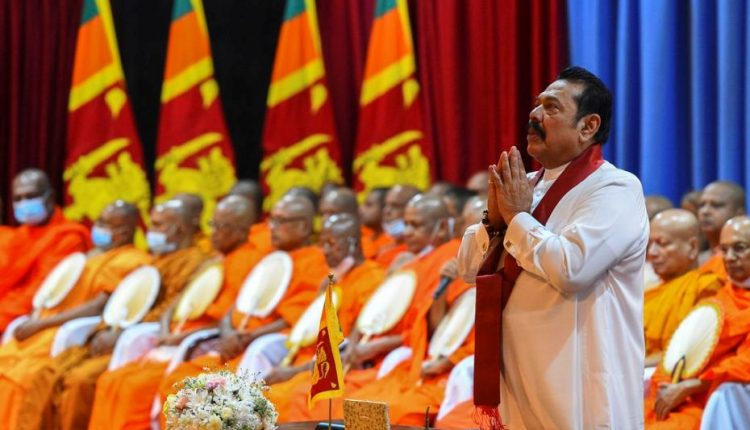Ban on cow slaughter may deepen Buddhist-Muslim divide in Sri Lanka
By Achal Malhotra
The ruling Sri Lanka Podujana Peramuna (SLPP) party, has announced its intention to impose a complete nation-wide ban on cow slaughter in Sri Lanka. Prime Minister Mahinda Rajapaksa is reported to have obtained the approval of the parliamentary group of his party though further action on the enactment of legislation is awaited.
The import of beef, however, is likely to be allowed for consumption by the beef-eaters.
The estimated population of over 22 million in multi-ethnic and multi-religious Sri Lanka comprises Buddhists (70.2%), Hindus(12.6%) and Muslims (also described as Sri Lankan Moors)(9.7%), and Roman Catholic Christians(6.1%) with a sprinkling of Burghers who are descendants of Europeans settled in Sri Lanka and married to Sri Lankan women)
Sri Lankans are by and large meat-eaters. However, for reasons of religion and culture, the Buddhists and Hindus, who venerate cow, are opposed to beef and thus are against cow slaughter. For Muslims and Christians (particularly of European dissent) on the other hand, beef is a part of their staple diet.
The per capita availability of beef per year is the second-highest (1.8kg) though far behind that of chicken (7.9kg) but much ahead of pork (0.32kg) and mutton (0.1kg)
Sporadic demands have been made in the past for a complete ban on cow slaughter. The net result was the Animal Protection Act of 1958 (amended in 1994) which prohibits, inter-alia, the slaughter of cows and calves below age 12.
The influential Sinhala-Buddhists, particularly the members of the Buddhist clergy, however, have pressurised the successive Governments, albeit unsuccessfully so far, for an outright ban on cow slaughter.
Reason behind fresh proposal on cow-slaughter ban:
In recent months the Rajapaksa brothers have considerably consolidated their political power in Sri Lanka.
Gotabaya Rajapaksa was elected as President in November 2019. More recently Mahinda Rajapaksa was reappointed as Prime Minister of the country after his Party SLPP won the parliamentary elections by big margins in August 2020. It secured 145 out of 225 Seats.
Prima-facie, the Rajapaksa brothers do not have any compelling reasons to please or appease; neither majority Sinhala Buddhists nor Hindu minorities by announcing their intention to ban cow slaughter. The opinion of the Muslim or Christian minorities, who have very limited influence, does not seem to matter politically.
Yet, there are two plausible explanations for the announcement within less than one month of assuming power.
First, this could be a way for Rajapaksas’ to say ‘Thank You’ to Sinhala Buddhists whose whole-hearted support to SLPP was an important factor in the party’s resounding electoral victory.
The announcement may also have been made to reassure them that their demand (for the ban) remains a priority for the government.
More importantly, however, is the need for sustained support from the Sinhala Buddhist majority in the context of the proposed 20th Amendment to the Constitution which is meant to neutralize /dilute the 19th Amendment of 2015 introduced by the previous government to curb the powers of the Executive President, while strengthening Parliament and independent commissions.
As a bonus, the Sri Lankan leadership may be hoping to win some brownie points with the indigenous Sri Lankan Hindus.
Tamil minorities in the Northern Province continue to be denied some of the rights envisaged under the 13th Amendment, particularly those pertaining to land and police.
It is a different matter that the ban is unlikely to please them beyond a point as they fully realize that but for the demand from the Sinhala Buddhist majority the issue would have never come on the table.
What next?
The ban if and when imposed may deepen the divide between the nationalist Sinhala Buddhists and Muslims. Sri Lanka has a long history of ethnic conflicts.
Even though the international focus was on the longest bloody conflict (1983-2009) between the Sri Lankan Tamils led by LTTE and the Sri Lankan government dominated by the Sinhala Buddhists, there have been numerous incidents of clashes between the Buddhists and Muslims in Sri Lanka.
A certain degree of Islamophobia is discernable in Sri Lanka. The Buddhists’ have been adversely commenting on the Islamic religious and cultural traditions such as wearing a Burka (Veil) by Muslim women or their insistence on eating only ‘Halal’ meat. The Buddhist claim the process of Halal, is painful and against the Buddhist ethos of compassion.
The trust deficit has deepened following the attacks on Churches and luxury hotels in and around Colombo in April 2019 as the local radicalized Muslim organizations were suspected to have played a role in providing support in this act of terror which left several hundred dead.
The anti-Muslim anguish found reflection in the Buddhist-Muslim clashed the following month which lasted for almost ten days. The Human Rights organizations worldwide have commented upon what they say are increasing incidents of violation of human rights of Muslims in Sri Lanka.
The ban will not be without any economic implications. The import of beef would entail further strain on depleted foreign reserves, besides adding to its cost and putting a burden on the pockets of the consumers.
It may also cause loss of some jobs though the supporters of ban argue that it would open avenues and employment opportunities in the dairy sector.
There are also issues related to infrastructure for the upkeep of barren and thus economically unproductive cows. Will the Buddhists agree to the killing or export of such cows?
Will the government overlook the likely socio-economic implications and go ahead? It remains to be seen as to when and how the Sri Lankan government would translate its declared objective into legislation.
-Achal Malhotra is a retired Indian Foreign Service officer ad this article was originally featured on wionews.com


